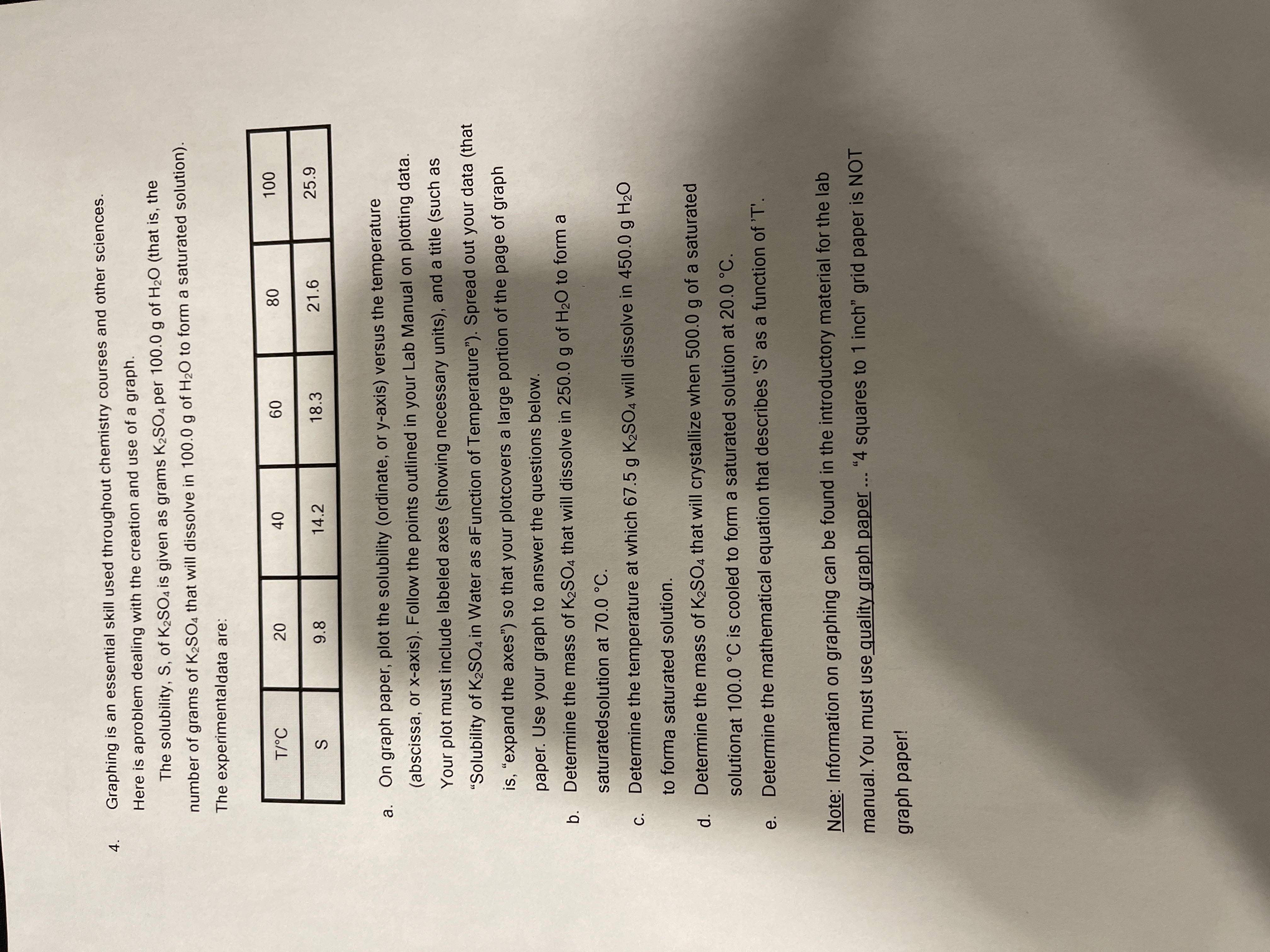
Chemistry
10th Edition
ISBN: 9781305957404
Author: Steven S. Zumdahl, Susan A. Zumdahl, Donald J. DeCoste
Publisher: Cengage Learning
expand_more
expand_more
format_list_bulleted
Concept explainers
Question
4e

Transcribed Image Text:4.
Graphing is an essential skill used throughout chemistry courses and other sciences.
Here is aproblem dealing with the creation and use of a graph.
The solubility, S, of K2SO4 is given as grams K2SO4 per 100.0 g of H2O (that is, the
number of grams of K2SO4 that will dissolve in 100.0 g of H2O to form a saturated solution).
The experimentaldata are:
T/°C
09
08
20
40
9.8
14.2
18.3
21.6
25.9
a.
On graph paper, plot the solubility (ordinate, or y-axis) versus the temperature
(abscissa, or x-axis). Follow the points outlined in your Lab Manual on plotting data.
Your plot must include labeled axes (showing necessary units), and a title (such as
"Solubility of K2SO4 in Water as aFunction of Temperature"). Spread out your data (that
is, “expand the axes") so that your plotcovers a large portion of the page of graph
paper. Use your graph to answer the questions below.
b. Determine the mass of K2SO4 that will dissolve in 250.0 g of H20 to form a
saturatedsolution at 70.0 °C.
c. Determine the temperature at which 67.5 g K2SO4 will dissolve in 450.0 g H20
to forma saturated solution.
d. Determine the mass of K2SO4 that will crystallize when 500.0 g of a saturated
solutionat 100.0 °C is cooled to form a saturated solution at 20.0 °C.
e. Determine the mathematical equation that describes 'S' as a function of 'T'.
Note: Information on graphing can be found in the introductory material for the lab
manual.You must use quality graph paper ... “4 squares to 1 inch" grid paper is NOT
graph paper!
Expert Solution
This question has been solved!
Explore an expertly crafted, step-by-step solution for a thorough understanding of key concepts.
Step by stepSolved in 2 steps with 1 images

Knowledge Booster
Learn more about
Need a deep-dive on the concept behind this application? Look no further. Learn more about this topic, chemistry and related others by exploring similar questions and additional content below.Similar questions
- What is the molar mass of unknown Z, .0578g and 1.12 x10 -3moles. 2$ 4 5 dele R Y F G H. K Larrow_forwardNitroglycerine is a shock-sensitive compound that decomposes as follows: 2 C3H5N3O9(l) --> 6 CO2(g) + 3 N2(g) + ½ O2(g) + 5 H2O(g) 10.0 kg of nitroglycerine sits in a 5.0-L cylinder. A chemist, angry that an experiment didn’t work, foolishly kicks the cylinder, thereby inadvertently performing his last and most dramatic experiment. The final temperature of the product mixture is 595 oC. Assume ideal gas behavior and complete decomposition. Calculate the total pressure (atm) in the cylinder the moment before the explosion.arrow_forward3. Convert 5.0 Tbytes to Mbytes. 5tutesx 0.000001 mby- ts - 5.00 0no mbytes 1 चि je %3D 1 fera 15.0x10 1. Subtract 3.58 x 102 kg from 1.41 x 101 ng and report your answer in g.arrow_forward
- 4 $2004 АД eptarrow_forwardA bottle of drinking water is labeled 24 fluid ounces (710 mL).” What is the mass in milligrams of 0.69 fluid ounces of the H2O? Suppose that silver is selling for $308 / lb. How many grams of silver could you buy for one dollar?arrow_forwardCH,2, Zn(Cu) Et,0 CH,l,, Zn(Cu) Et,0arrow_forward
- Exta credit 1. Na0Me 2.H₂504 Δarrow_forwardO Select the strongest acid. O I— ④SH HOH H OH Iarrow_forwardthe Question 5 A graph that displays a straight line when the reciprocal of the concentration is plotted as a function of time. The graph has a slope of 0.176 and a y-intercept of 0.837. What is the concentration? (the answer should be entered with 3 significant figures; do not enter units; give answer in normal notation- examples include 1.23 and 12.3 and 120. and -123) Selected Answer O 5.68 Correct Anwer O 1.19 196arrow_forward
- A sample of nitrogen gas, N2, travels 17.0 cm in 4.5 minutes. How long in minutes would it take chlorine gas, Cl2, to travel a distance of 17.0 cm under the same conditions?arrow_forwardHöhörs Chemistry- 4th Hour - Dr. Paul / Gases/Lesson 148 What does the kinetic molecular theory tell us about the temperature of a substance? O The temperature of a substance does not affect the motion of the particles. OA substance with a lower temperature has particles that move faster. O A substance with a higher temperature has particles that move slower. O A substance with a higher temperature has particles that move faster.arrow_forwardEvery year Every second (1 year 365 days).arrow_forward
arrow_back_ios
SEE MORE QUESTIONS
arrow_forward_ios
Recommended textbooks for you
 ChemistryChemistryISBN:9781305957404Author:Steven S. Zumdahl, Susan A. Zumdahl, Donald J. DeCostePublisher:Cengage Learning
ChemistryChemistryISBN:9781305957404Author:Steven S. Zumdahl, Susan A. Zumdahl, Donald J. DeCostePublisher:Cengage Learning ChemistryChemistryISBN:9781259911156Author:Raymond Chang Dr., Jason Overby ProfessorPublisher:McGraw-Hill Education
ChemistryChemistryISBN:9781259911156Author:Raymond Chang Dr., Jason Overby ProfessorPublisher:McGraw-Hill Education Principles of Instrumental AnalysisChemistryISBN:9781305577213Author:Douglas A. Skoog, F. James Holler, Stanley R. CrouchPublisher:Cengage Learning
Principles of Instrumental AnalysisChemistryISBN:9781305577213Author:Douglas A. Skoog, F. James Holler, Stanley R. CrouchPublisher:Cengage Learning Organic ChemistryChemistryISBN:9780078021558Author:Janice Gorzynski Smith Dr.Publisher:McGraw-Hill Education
Organic ChemistryChemistryISBN:9780078021558Author:Janice Gorzynski Smith Dr.Publisher:McGraw-Hill Education Chemistry: Principles and ReactionsChemistryISBN:9781305079373Author:William L. Masterton, Cecile N. HurleyPublisher:Cengage Learning
Chemistry: Principles and ReactionsChemistryISBN:9781305079373Author:William L. Masterton, Cecile N. HurleyPublisher:Cengage Learning Elementary Principles of Chemical Processes, Bind...ChemistryISBN:9781118431221Author:Richard M. Felder, Ronald W. Rousseau, Lisa G. BullardPublisher:WILEY
Elementary Principles of Chemical Processes, Bind...ChemistryISBN:9781118431221Author:Richard M. Felder, Ronald W. Rousseau, Lisa G. BullardPublisher:WILEY

Chemistry
Chemistry
ISBN:9781305957404
Author:Steven S. Zumdahl, Susan A. Zumdahl, Donald J. DeCoste
Publisher:Cengage Learning

Chemistry
Chemistry
ISBN:9781259911156
Author:Raymond Chang Dr., Jason Overby Professor
Publisher:McGraw-Hill Education

Principles of Instrumental Analysis
Chemistry
ISBN:9781305577213
Author:Douglas A. Skoog, F. James Holler, Stanley R. Crouch
Publisher:Cengage Learning

Organic Chemistry
Chemistry
ISBN:9780078021558
Author:Janice Gorzynski Smith Dr.
Publisher:McGraw-Hill Education

Chemistry: Principles and Reactions
Chemistry
ISBN:9781305079373
Author:William L. Masterton, Cecile N. Hurley
Publisher:Cengage Learning

Elementary Principles of Chemical Processes, Bind...
Chemistry
ISBN:9781118431221
Author:Richard M. Felder, Ronald W. Rousseau, Lisa G. Bullard
Publisher:WILEY